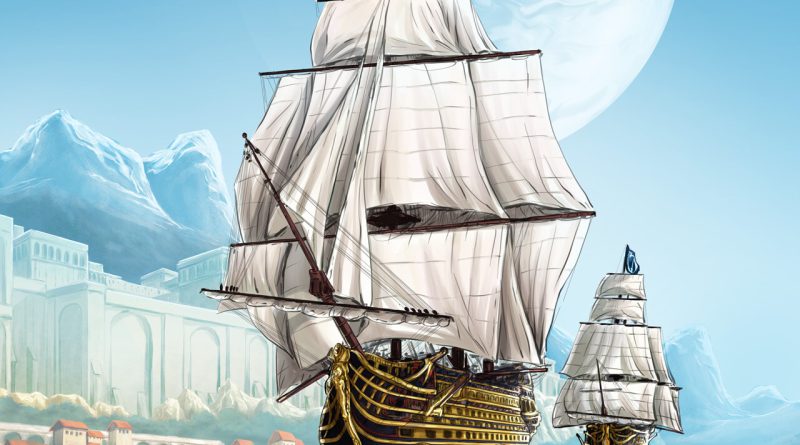The adventures of Loss
“No one really considers the arrival of a band of Adventores within the walls of a city or village to be good news, except perhaps the merchants and hucksters. When these unattached, unconnected travelers arrive from nowhere, who knows what they’ve done, who they really are and what forced them to choose the adventurous life over the honorable duty of looking after their families? But the most serious question that arises when you come across them, even though there’s almost no chance of it happening, is: could one of them be a demon Loss Singer?”
From the travels & encounters of Galladus Acridès.
Adventures in the world of Loss
The player-characters (the PJs) are those of the lossyans who fear neither the dangers of the sea, nor the ghosts of the night, nor the demons Loss Singers . Adventurers, travelers, explorers, mercenaries, pirates, reprobates, heretics, progressives, libertarians, scientists, engineers, fugitives and lost landlubbers, they all have three things in common: their courage surpasses superstitious fear of the unknown, they have decided by choice or necessity to leave the security of home and, whether they seek it or it comes to them without asking, they attract the glory that writes their Legend.
What Loss adventurers do
Player-characters are adventurer, a word that most Lossyan cultures use, imbuing it with respect, mistrust and a touch of disdain. After all, an adventurer is a person who has no family and no close ties, and prefers to wander the roads rather than serve and remain close to his family.
There’s an athémaïs word for these individuals: adventores, literally “those who happen”. By default, an adventurer is considered to be a traveler who has come from elsewhere on private business or because he has been hired, far from home. This means that not only is he a potential source of trouble, but he’s also a man who’s unfamiliar with local customs and codes – in short, he’s a bit of a barbarian – and above all, he has no family to look after, as any man of honor should. This is why an adventore is viewed with suspicion, and a little disdain. Yet lossyans will also respect him. He’s a man who travels, who discovers, who has the courage to dare to explore the world, and no doubt also the wisdom to survive it. In a world where 95% of people never go further than the biggest local market a day’s cart ride away, the adventurer is a legendary figure, and it’s almost certain that at the first opportunity he’ll be asked to tell exotic anecdotes from his travels!
Adventurers travel and operate in teams, for reasons of survival and efficiency. Adventores often work in the service of a rich and powerful man who needs people to carry out out-of-the-ordinary tasks that he can’t do himself. Some of these tasks may be criminal, such as theft, exfiltration, hostage-taking, murder or sabotage. Others may be totally legal and more commercial, such as escorting, transporting sensitive or secret data, or protecting important individuals. Finally, it can be more exotic and dangerous, like exploring a wilderness suspected of harboring a loss-metal deposit, or an expedition to Ancient Ruins supposed to exist, or known and discovered, but never mapped.
One thing that defines Loss adventurers is their Motivation: each player-character chooses one, but can also invent one, which defines the reasons why the character has decided to take to the roads and become an adventore. They may be wanted, seeking revenge, unlucky in life or following an ideal too great to remain wisely behind city walls. Motivation is the primary driving force behind player-characters, the fuel that will launch their first adventures and encounters.
An important one for Loss adventurers is their relationships and contacts. Not all player-characters have these, but they are advantages that can be purchased at character creation. The social level, membership of a merchant guild or a religious or state organization, imposes constraints, but also provides relational and material advantages to people who know full well that their work almost always gets them into trouble, sometimes much bigger than the problems their work has solved.
The main types of adventurers
Often, a group of adventurers, with all its diversity, is hired or brought together with a specialty, which will influence their tasks and efficiency. Here are the four main types of adventurer groups. It’s likely that a group will ultimately bring together archetypal characters from all four of these major types. But this classification helps us to know which adventures the characters will experience, and in what context.
Merchants
Scholars, merchants, spies, officers, diplomats and artists, negotiators are employed to solve problems through discussion and bargaining. The aim of these tasks is to avoid bloodshed and tensions leading to open conflict. This requires cunning, financial resources, social pressure, and lots and lots of preparation, negotiation and patience.
Condottieri
Gunslingers, swordsmen for hire, scouts, bodyguards or mercenaries, condottieri are tasked with killing or protecting for money, which can quickly turn out to be more complicated than imagined. In a savage world, with its deadly wildlife, their strength and martial efficiency are indispensable, as is their experience in avoiding danger. In cultures where law enforcement and the justice system are a blurred concept, and where power is not only limited but often corrupted, their task is to solve certain problems that require radical solutions, as well as to prevent their client’s or master’s rivals from using the same methods.
Night runners
Assassins, thieves, spies, cat burglar and other traffic experts, night runners are primarily involved in trespassing, theft, discreet assassination and the art of remaining unnoticed. A bit like condottieri, they are hired to quickly and efficiently solve problems that are difficult or impossible for the law to resolve. Whether it’s kidnapping a rival’s family member, making compromising documents disappear, stealing an industrial secret or simply precious objects, or spying on an adversary’s activities, night runners are the invisible, indispensable instrument of many public affairs and scandals. But they are also people who work on their own account, independently or with the Courts of Shadows. After all, stealing is an efficient way to make money, as long as you don’t get caught.
Explorers
Sailors, captains, scientists, travelers, merchants and artifact hunters, explorers seek out new trade markets, new resources and new riches, as well as forgotten or undiscovered secrets all over the little-explored world of Loss. Explorers often have patrons or sponsors, because to explore, you need a levitating ship or a powerful, heavily-armed caravan – in short, the means. But discovering new riches, new secrets and new trade routes guarantees both great income and glory for the adventurer and his or her sponsor.
The settings
There are three main settings in the world of Loss: the urban settings of city-states, the seas and coasts of sea voyages, but also the rivers and plains of voyages by levitating ships, and finally the wildest regions where the most reckless explorers and men venture.
The role-playing game, The Songs of Loss, tends to focus on urban adventures. City-states are at the heart of the greatest political intrigues in the world of Loss, and the most dangerous adversary is always the man on Loss. Conflicts, wars, vendettas are initiated and concluded in the cities, where the greatest quests and the most distant journeys are launched; but also where people negotiate, buy, sell and trade. In short, it’s where most of the action happens.
But sea and land travel are also very important. It’s assumed that sooner or later, a group of adventurers will have access to a levitating ship, whether they crew one or are entrusted with one by a sponsor, or whether the player-characters have the means to buy such a vessel, maintain it and pay its crew. But a group of adventurers may also be forced by necessity to travel on horseback or other land-based mount, despite the danger of such expeditions once away from urban areas. These journeys are rich in adventures and surprises, with stopovers and exchanges. They are also the occasion for dangers, pirates, local wars, violent attacks by wildlife, disasters and other tragedies.




